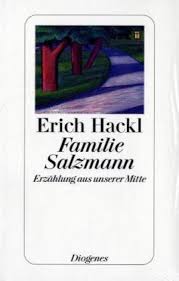This is the first book I've read by the Austrian writer Erich Hackl. Hackl writes "docu-novels" – books about actual people and true events which are based on interviews, diaries, letters, court documents, etc. He fills in the "gaps" to create a compelling narrative with imagined dialogue, interior monologues and speculative plot devices. Hackl's subjects are usually individuals who have been persecuted or unjustly treated. In his 2010 book Familie Salzmann Hackl explores three generations of an Austrian-German family who was persecuted – first by the Nazis, then by the totalitarian East German state, and finally by relentless anti-Semitism (even though the family was not Jewish). The novel is framed by the experiences of Hanno Salzmann, who in the 1990's worked as a claims processor for a health insurance group in Austria. He was a valued employee and consistently received superior performance appraisals from his supervisors until one day he confided with a colleague: " Meine Oma ist in einem KZ umgekommen." ("My grandmother died in a concentration camp").
The story then follows the journey of the grandmother – Juliana Sternad – who as a young woman leaves her impoverished village in Austria and makes her way to Bad Kreuznach in Germany where she meets a young labor organizer Hugo Salzmann. They marry and soon produce a son – also named Hugo. Hugo Salzmann joins the communist KPD and is forced to flee with his family to Paris after the Nazi seizure of power. Paris provides only temporary sanctuary: Hugo and Julia are eventually betrayed and arrested by Nazi collaborators. Juliana ends up in the Ravensbrück concentration camp, where she succumbs to typhus, while Hugo is shunted to various camps and prisons in Germany but manages to survive the war. Before her arrest, Juliana manages to send her son Hugo to her sister Ernestine, who raises him as her own son. Ernestine is a compelling figure, and Hackl shows how ordinary citizens were able to resist the Nazi regime and still make do.
Salzmann returns to Bad Kreuznach after the war and quickly finds his footing again, serving on the city council until the KPD was banned. He remarried, has children with his new wife, but has little connection with his first son, Hugo. The younger Hugo, perhaps hoping to earn the praise of his father, emigrates to the communist DDR. But life in the workers' paradise doesn't turn out as expected, and the younger Hugo is forced to leave East Germany with his young family in order to find adequate care for his child with severe disabilities. This act was seen by his father as "treason" (Verrat) and he promptly disowns him. (In an incredibly severe letter Salzmann Sr. describes his son's actions as "der schlimmste Vertrauensbruch eines Sohnes gegenüber dem Vater." ("The worst possible breach of trust of a son towards his father.")
It is the final section of Familie Salzmann that is somehow the most infuriating, even though the events described are not as horrific as what transpired at Ravensbrūck. But they take place in social-democratic – and supposedly enlightened – postwar Austria. After sharing that his grandmother had perished in Ravensbrūck Hanno Salzmann's colleagues assumed he is Jewish (he isn't) and began to harass him. One office mate greets him with "Sieg Hiel, Hitler lebt., Mein Kampf muβ man gelesen haben!" and then "Die Juden würden uns alles wegnehmen und zu wenige im KZ gelandet sind." When he complains to his superiors about the constant anti-Semitic bullying he is accused of being a "trouble maker" (Unruhestifter) and summarily fired from his job.
And so the cycle of persecution and injustice continues. Familie Salzmann is a story worth telling, but Hackl reminds us that in real life there are no happy endings.


